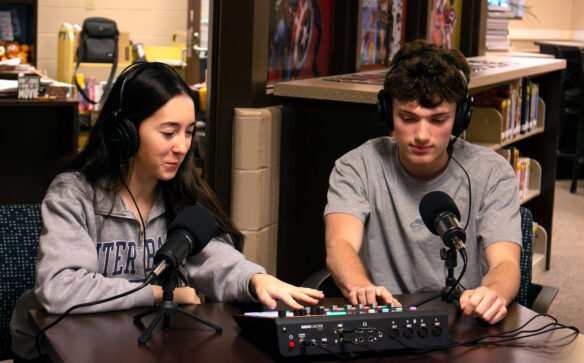
Addison Spurrier and Jacob Coffey, students at Daviess County High School, work in the podcast studio that was established with the help of grant money the school received from the Kentucky Society for Technology in Education (KySTE). Photo courtesy of Koyln Cruz
Two years ago, Apollo High School (Daviess County) Assistant Principal Chad Alward helped create a media arts program for students to explore technology initiatives.
“We decided to look at what the community needed and what students needed to know to be prepared to work in this community,” said Alward.
Classes offer learning skills such as video editing, digital photography and graphic design. Alward said the program holds a few classes to gain entry-level skills, but the students needed another outlet to continue their passions in the media arts industry. One of those solutions, he said, was to create a podcast studio.
The Daviess County school district has been awarded two grants totaling almost $20,000 from the Kentucky Society for Technology in Education (KySTE) Outreach Grant. The grants will be used to help both students and educators enhance the technology initiatives within the district.
One $10,000 grant will be used to establish a podcast studio at Daviess County High School. This studio will serve as a space for students to develop their communication skills, explore multimedia storytelling and engage in creative expression through podcasting.
Instructional Technology Coordinator Aaron Yeiser said the studio will offer students a platform to produce high-quality audio and video content across various subjects and interests.
“The podcasting grant will supply the means to build a creativity hub where students can develop as global communicators,” said Yeiser.
He added that this studio can be used to represent different areas of the Kentucky Portrait of a Learner. It gives the students a space to be creative contributors and effective communicators by learning a skillset they can use outside of the classroom.
“It takes projects like this to make it authentic rather than just something contrived on short notice in the classroom,” said Yeiser. “These are real-life jobs; we do podcasts, video and audio and then maybe there is an entire account of social media that goes with it.”
Alward said he hopes this resource will become more than just a skill the students learn. He hopes to see the students turn the podcasting studio into a mentorship opportunity where students can teach one another.
“They’ve got the skill levels, and they needed an opportunity to be more independent,” said Alward. “Our goal is to develop this into a mentoring program to where we do have those kids who are available from the media arts program to teach other students interested in podcasting.”
The second grant, worth $9,655, has been allocated to establish the Apollo High School and Daviess County High School Student Information Technology Support Pathway. Apollo High School Assistant Principal Mason Head said this program empowers students with firsthand experience in technology repair and maintenance, providing valuable skills for their future careers.
“The grant will enable the enhancement of resources and tools necessary to expand the program’s reach and effectiveness, expanding our students’ respective skill sets and better preparing them for their future,” said Head.
Throughout the years, Alward said there has always been an opportunity for students to learn at a help desk, but this will be the first time they are creating a full career and technical education (CTE) pathway which will continue to provide students with real-world experience in our schools.
“In the end, our students will be better prepared to enter the workforce or pursue higher education opportunities,” said Alward.
Computer Operations Manager Steve Burton said the new program will continue to encourage students within their community who want to explore a career after high school.
“It’s about growing your own,” said Burton. “I’ve got good technicians here, but they come and go. What better place to look for new technicians than the students within our ranks who excel and enjoy doing this.”
Taking advantage of hands-on learning throughout the district, Yeiser hopes this new help desk will create a better relationship between the educators and technology staff.
“I’m excited about the students being involved, I think it will knock down the barriers where it may be a little intimidating to walk down the hall to the technicians and have to admit not knowing how to fix the problem,” said Yeiser. “Our teachers may feel more inclined to take problems to get resolved with the students helping them solve their technology issues rather than just living with frustrations.”
Daviess County plans to introduce these new experiences and opportunities to the students this upcoming school year.




Leave A Comment